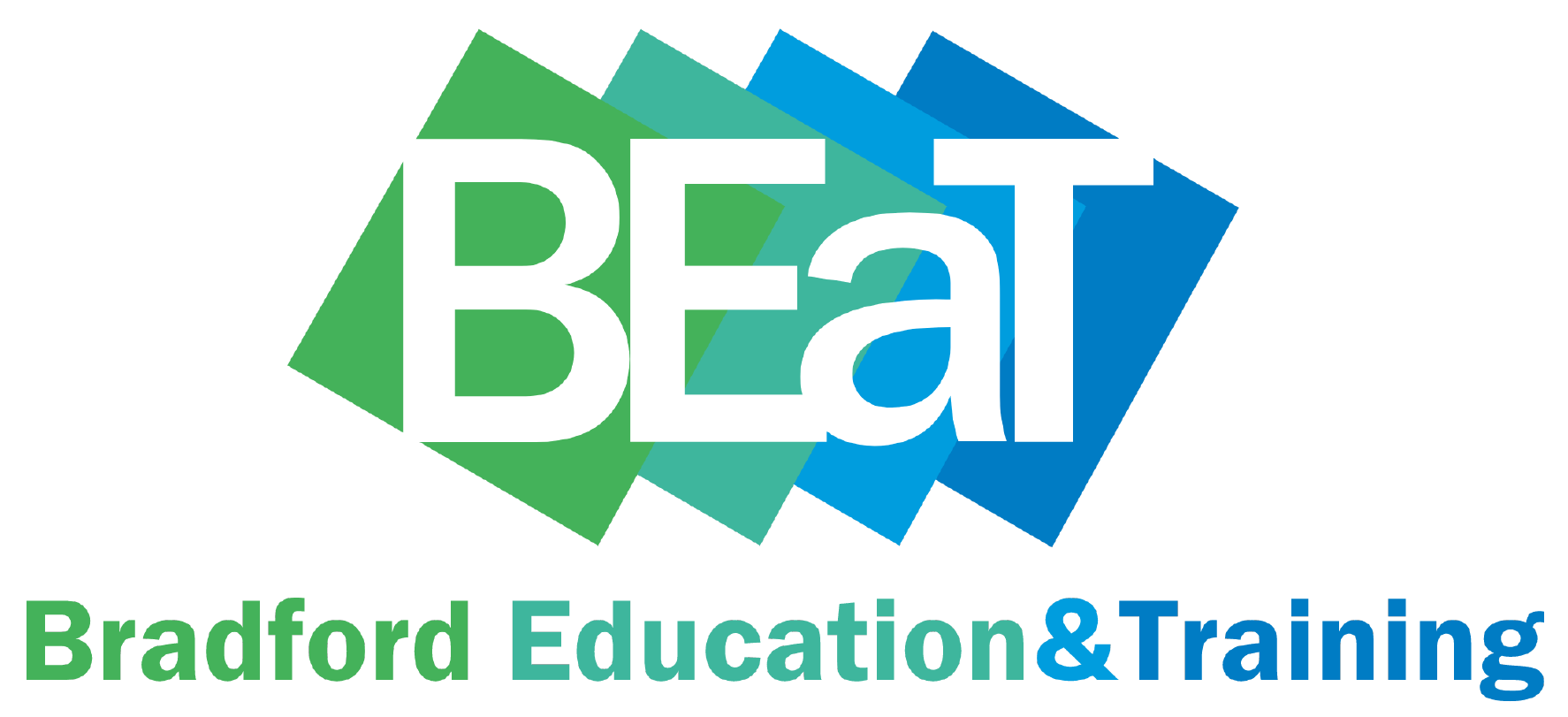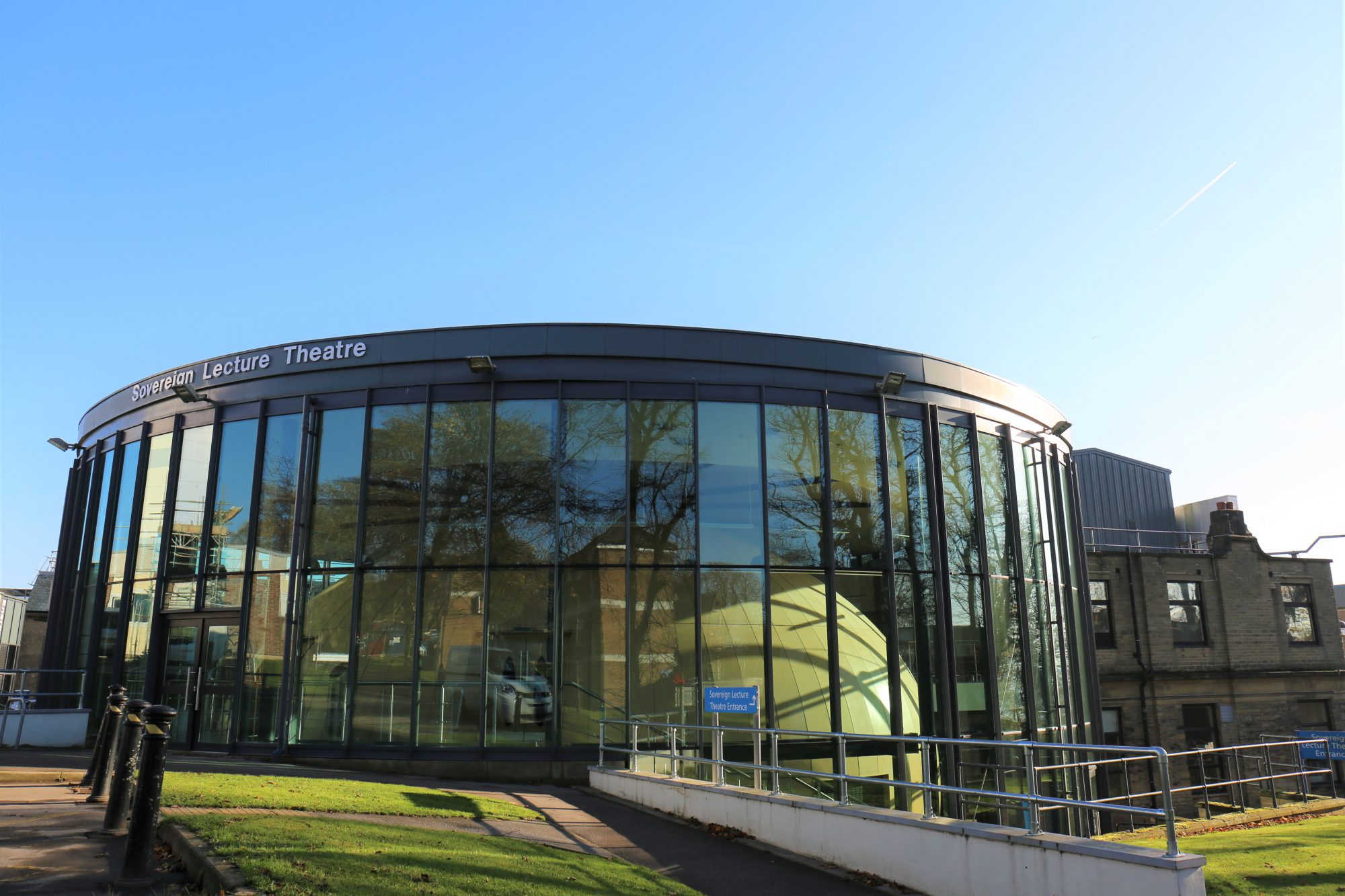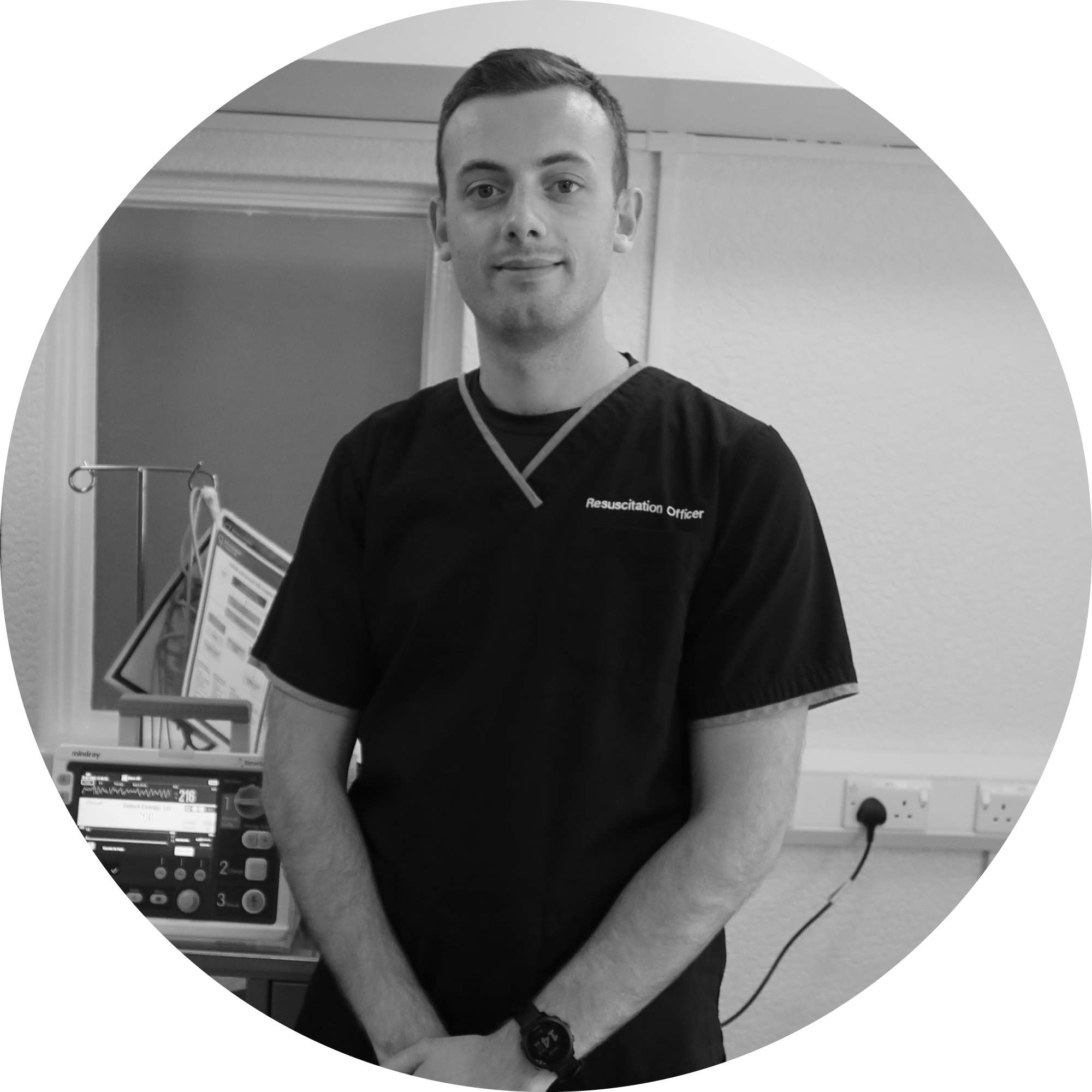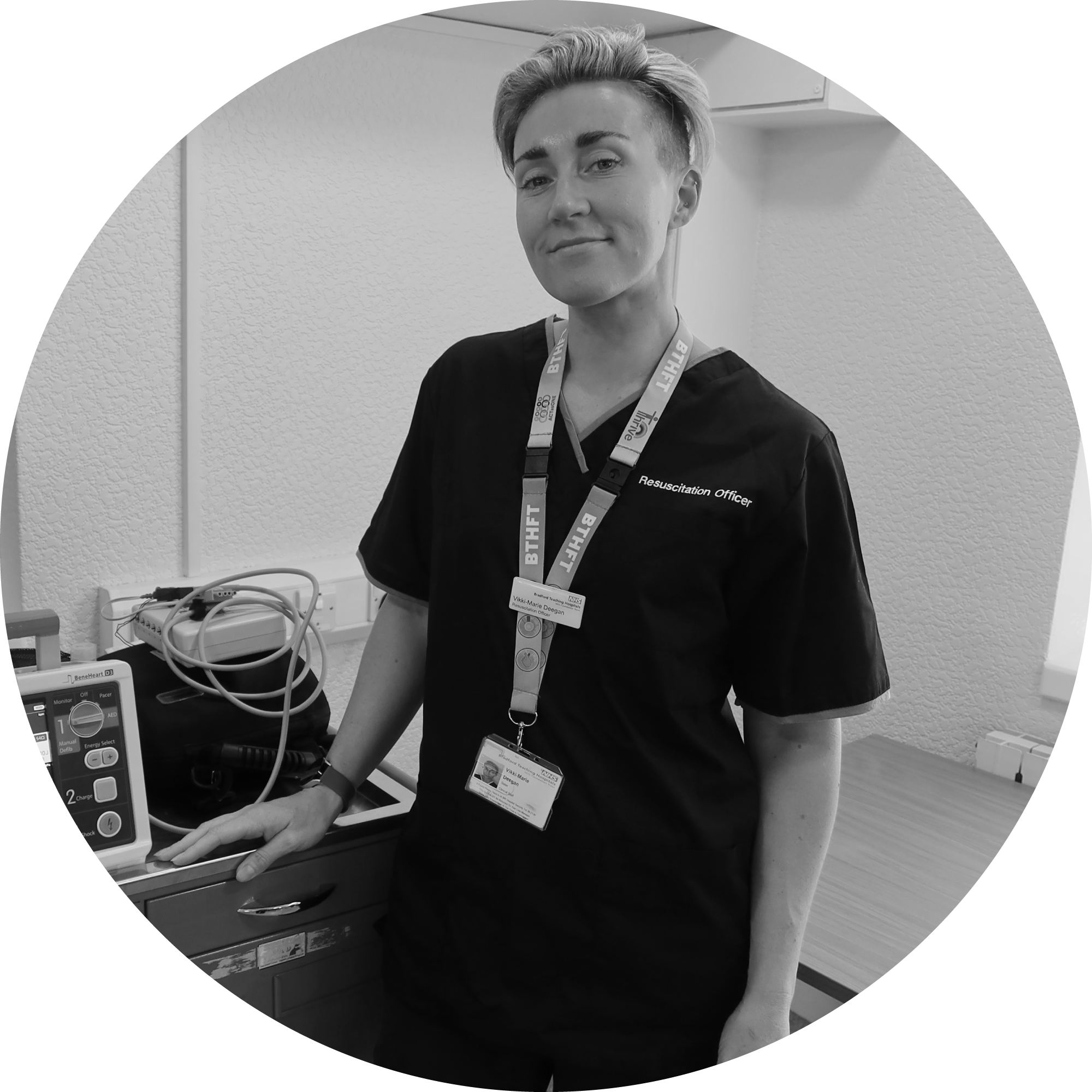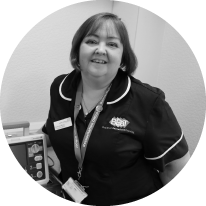Welcome to the Resuscitation Training Department at Bradford Teaching Hospitals NHS Foundation Trust. Our dedicated team is based on B Floor of the Field House Education Centre at Bradford Royal Infirmary. We are passionate about empowering healthcare professionals with the knowledge and skills required to deliver life-saving care.
We offer training for both internal and external staff. If you would like to inquire about available course spaces, please contact us at bookings.resuscitation@bthft.nhs.uk. For the courses we deliver, please see the list below.
About us
Our team is a diverse group of experienced healthcare professionals with backgrounds spanning Accident & Emergency, Coronary Care, Paramedicine and Paediatrics. This unique blend of expertise allows us to provide comprehensive, tailored training to meet the varied needs of healthcare teams across all settings.
What we do
The Resuscitation Team plays a pivotal role in training healthcare professionals to recognise and manage deteriorating patients effectively, utilising both simulated environments and real clinical settings. In addition to education, the team conducts audits and provides guidance to ensure that the trust maintains safe environments aligned with Resuscitation Council UK standards and local trust policies. The team also participates in cardiac arrest calls whenever educational commitments allow, further supporting patient safety and clinical excellence.
Resuscitation Courses Available
At BEaT our focus is always to ensure that we provide the best possible education for staff in all aspects of their training and, ultimately, the development of the next generation of healthcare professionals.
Basic Life Support is booked via ESR or via the email mandatory.training@bthft.nhs.uk All other courses are booked by the team bookings.resuscitation@bthft.nhs.uk
The ILS course is suitable for doctors, medical students, nurses, nursing students, midwives and healthcare providers such as physiotherapists, dentist and ambulance technicians. It may also be suitable for fire service technicians, police personnel and prison officers.
Learning outcomes:
The ILS course teaches the knowledge and skills to:
- Identify the causes and promote the prevention of cardiopulmonary arrest;
- Recognise and treat the deteriorating patient using the ABCDE approach;
- Undertake the skills of quality CPR and defibrillation (manual and /or AED) and simple airway manoeuvres;
- Utilise non-technical skills to facilitate initial leadership and effective team membership
This can be booked by the team bookings.resuscitation@bthft.nhs.uk
The PILS Course is appropriate for the following candidates: doctors, medical students (final year), nurses, health visitors, school nurses, nursing students (final year), midwives, ODPs, cardiac technicians, resuscitation officers, physiotherapists, dentists, dental nurses, ambulance technicians/paramedics.
The PILS course addresses the needs of staff that need more advanced skills than those taught during basic life support (BLS), but who do not require the more comprehensive two-day European Paediatric Advanced Life Support (EPALS) course.
Learning outcomes:
The ILS course teaches the knowledge and skills to:
- The PILS course teaches the knowledge and skills to:
- Understand the structured ABCDE approach that facilitates rapid recognition of seriously ill children;
- Provide appropriate initial treatment interventions to prevent cardiorespiratory arrest;
- Treat children in respiratory or cardiorespiratory arrest until the arrival of a resuscitation team or more experienced assistance;
- Promote active membership of a paediatric resuscitation team.
This can be booked by the team bookings.resuscitation@bthft.nhs.uk
Candidates who have been recommended as having instructor potential (IP) from their ILS course can attend the ILS Instructor (ILSi) course. ALS providers can be nominated provided they meet the selection criteria. The ILSi course must be undertaken within two years of the date of the provider course.
Learning outcomes:
The ILSi course teaches the knowledge and skills required to:
- Understand the nature of teaching and learning;
- Understand the needs of individual learners;
- Understand the awareness of the four domains of learning;
- Undertake the various types of teaching sessions on the provider course.
This can be booked by the team bookings.resuscitation@bthft.nhs.uk
The ALS provider course is designed for healthcare professionals who would be expected to apply the skills taught as part of their clinical duties, or to teach them on a regular basis. Appropriate participants include doctors, paramedics and nurses working in acute care areas (e.g. ED, CCU, ICU, HDU, operating theatres, acute medical admissions units) or on resuscitation /medical emergency/ICU outreach teams. All applicants must hold a professional healthcare qualification or be in training for a professional healthcare qualification.
Learning outcomes:
- Recognise and treat the deteriorating patient using a structured ABCDE approach;
- Deliver standardised CPR in adults;
- Manage a cardiac arrest by working with a multidisciplinary team in an emergency situation;
- Utilise non-technical skills to facilitate strong team leadership and effective team membership.
This can be booked by the team bookings.resuscitation@bthft.nhs.uk
The NLS course is designed for any healthcare professional involved in the delivery and care of the new born infant. This includes both junior and senior medical and nursing staff, midwives, paramedics and resuscitation officers. All applicants must hold a professional healthcare qualification or be in training for a professional healthcare qualification.
Learning outcomes:
- The NLS course teaches the knowledge and skills required to:
- Approach to the management of a new born infant during the first 10-20 minutes in a competent manner;
- Understand the processes underlying apnoea, bradycardia and poor condition at birth;
- Deliver practical airway management and ventilatory support.
This can be booked by the team bookings.resuscitation@bthft.nhs.uk
The European Paediatric Life Support (EPALS) Course is designed for healthcare professionals who are involved in the resuscitation of infants and children as part of their clinical duties. This includes doctors, nurses, and paramedics working in acute care settings such as emergency departments, paediatric wards, intensive care units, and operating theatres. The course is also suitable for those on paediatric or resuscitation/medical emergency teams. All applicants must hold a professional healthcare qualification or be in training for one.
Learning outcomes:
- Recognise and manage the deteriorating paediatric patient using a structured ABCDE approach.
- Deliver effective paediatric and infant CPR.
- Manage paediatric cardiac arrest situations within a multidisciplinary team.
- Apply non-technical skills to enable strong leadership and effective team collaboration in emergencies.
For bookings or inquiries, please contact bookings.resuscitation@bthft.nhs.uk
The Generic Instructor Course (GIC) is a standardised national course teaching the principles of adult learning and is a joint collaboration between the Resuscitation Council (UK) and the Advanced Life Support Group (ALSG). Candidates who have been recommended as having instructor potential (IP) from their provider course (e.g. ALS, NLS, APLS, MIMMS) can attend the GIC. The GIC must be undertaken within four years from the date of the provider course.
Learning outcomes:
- The GIC teaches the knowledge and skills required to:
- Understand the nature of teaching and learning;
- Understand the needs of individual learners;
- Understand the awareness of the four domains of learning;
- Undertake the various types of teaching sessions on the provider courses
This can be booked by the team bookings.resuscitation@bthft.nhs.uk
